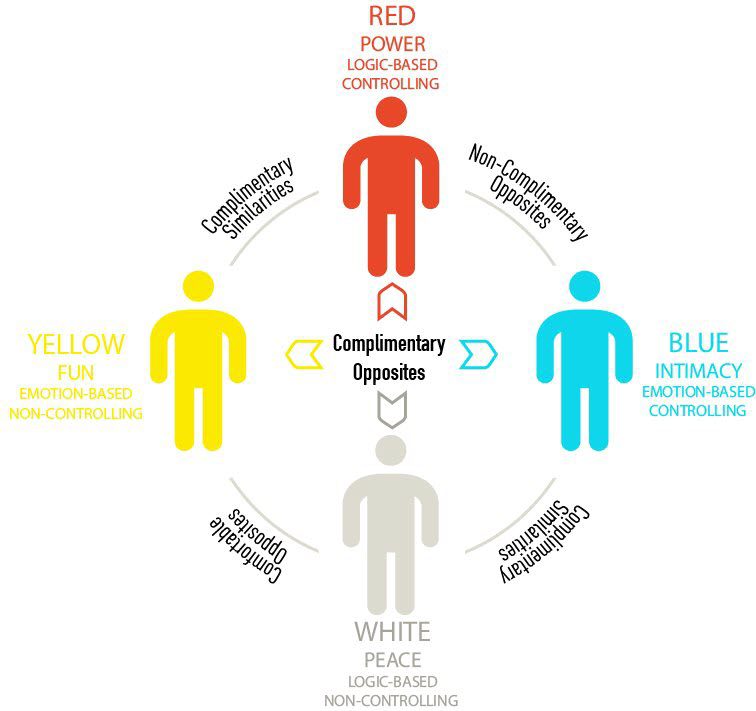What is the Blue Color Code Personality Type?
The Blue Color Code Personality Type’s driving motivation is Altruism. They continually look for opportunities to give up something to bring another person happiness and love to do nice things for others.
Selflessness rather than selfishness is their guiding philosophy, and many feel uncomfortable doing things solely for themselves.
They hold doors open for people, offer rides when someone’s car breaks down, contribute to charities, and even devote their entire lives to helping others.
Blue Personality Type cross-reference
- Keirsey Type – Idealists
- Temperament Type – Phlegmatic
- Animal Type – Otter
- DISC Type – Influential
- Socio-Communicative Type – Expressive
- True Colors – Blue
- Personality Compass – West
- Occupational Type – Artistic
- Learning Type – Theorist
- Leadership Type – Collaborator
MBTI Personality Types (xNFx) – Intuition and Feeling
Enneagram Types
- Type 1 – The Reformer (ENFJ, INFJ)
- Type 4 – The Individualist (INFJ, INFP)
- Type 7 – The Enthusiast (ENFP)
- Type 9 – The Peacemaker (INFP)
Blue Personality Type Careers
What are the Color Code Personality Types?
The Color Code Personality Type, or The People Code, was created by Dr. Taylor Hartman, and it classifies Personality Types by Core Motives.
It helps you understand an individual’s motives and the “Why people do what they do” to gain insight into people’s behavior and build more effective relationships with the people you interact with regularly.
The system helps you recognize your innate strengths and limitations and shows you how to use those traits in your personal and professional life.
The Color Code Personality Type system is similar to the four core Personality Temperaments. Still, it focuses more on the individual’s core motivations.

Personality Temperaments, Traits, and Types
Personality Temperaments, Personality Traits, and Personality Types are used in Psychology to discuss a person’s Personality, a collection of Emotions, Perceptions, and Actions that interact with each other, regulate themselves, and shape a dynamic system that forms a person’s Behavioral Patterns.
Your inherited Traits (your Personality Temperament), along with your acquired Traits (such as education, socialization, and other various pressures and aspects in your life), form your Personality.
A Personality Type identifies a specific collection of Traits, both learned and natural, that comprise a broad, general Personality Classification—a way of labeling a collection of traits and behaviors.
A Personality Trait remains consistent and stable over time, which means you exhibit the same pattern across different situations and throughout your life.
Three criteria characterize Personality Traits: (1) consistency, (2) stability, and (3) individual differences. For example, if you are talkative at home, you also tend to be talkative at work. And if you were talkative at age 20, you would still be chatty at age 40.
Personality Temperament is your “Naturally Intuitive” biological Trait. These Traits are partly inherited from your genes and partially determined by your brainstem, which doesn’t change throughout your life. These are Natural Traits regarded as innate or inborn and not learned.
Your Personality Temperament is formed as an infant and is hard to modify, manipulate, or change because it is genetic. In some way or another, your inherited behavioral tendency will always be there.
Personality Traits are the quantitative differences between people, and Personality Types are qualitative differences between people. The most crucial difference between the Trait Theory and Type Theory is that Type Theory views people’s characteristics as discrete categories. In contrast, Trait Theory views these characteristics as a continuum.
For example, where a Type Theorist would claim that introverts and extraverts are two types of people, a Trait Theorist claims extraversion is a gradient and individuals can fall somewhere in the middle.
Your Temperaments, along with acquired Traits, form your Personality.
Blue Characteristics

- Blues are a beacon of goodness and truth.
- They appreciate creativity, committed relationships, and disciplined achievement.
- Blues can be logical. They are more likely to respond to an emotional plea.
- Life is emotionally a double-edged sword – The positive side is giving and being sensitive – The negative side is an unforgiving and too-sensitive Roller coaster of emotions – Allowing their hearts to rule their minds.
- They are committed and loyal.
- Blues are usually perfectionists – Highly critical of themselves and others.
- They don’t delegate well – Stand over others like mother hens.
- Blues are self-disciplined and stable.
- They are self-sacrificing and nurturing – They think of others before themselves.
- Blues give more than any others but also forgive the least.
- They worry about everything.
- Blues value manners and have a strong work ethic.
- They are moody and complex.
- Blues are self-righteous and insecure.
Blues seek intimacy.
More than anything else, Blues want to love and be loved. A true Blue will sacrifice a successful career to improve a meaningful relationship.
Once considered a female characteristic solely, this nurturing is more accurately understood as a Blue personality trait.
Blues crave to be understood.
Blues are gratified when they are listened to and feel understood and appreciated.
They are notorious for revealing their inadequacies because they greatly value being known and understood.
In the eyes of Blue, being vulnerable is a small price to pay for the chance to connect emotionally.
Blues may have their hearts broken more than most people, but they also spend much more time in love.
Blues need to be remembered and appreciated.
With Blues, a simple pat on the back will not suffice.
They need to be thanked and remembered explicitly for their good deeds and need sincere gratitude.
Blues delight in being remembered on birthdays and other special days, especially if the remembrance is personal—a homemade anniversary card, a welcome home party, or a special day that isn’t on the calendar.
Blues need tender, loving care.
A solid moral conscience directs the Blue Type.
Blues are motivated to behave in a proper, appropriate manner.
They have a moral code guiding their decision-making, value judgments, and leisure time. As a result, Blues enjoy being “good.”
Blues come equipped with the most vital sense of integrity of all the personality colors. A Blue would rather lose than cheat. They are trustworthy.
Ethically, Blues are the people who should be in positions of power but seldom are.
Strengths
- Sees life as a severe endeavor.
- Strong skills in empathizing with others.
- They plan well and follow through superbly.
- Enjoys detail and schedules.
- Self-sacrificing.
- Loyal forever.
- Values relationships and places a high priority on them.
- Sees life as a severe endeavor.
- Appreciates beauty and detail.
- Has a robust aesthetic sense.
- Stable and dependable (plowhorse vs. racehorse).
- Sincere and emotionally deep.
- Analytically oriented (concerned with why one behaves as they do).
- High achiever.
- A Deep sense of purpose.
- Loyal forever once a friendship is established.
- Genuine concern for other people’s well-being.
- Remembers special holidays and promotes celebrations.
- They are encouraging in times of trouble.
- Willing to commit time to the relationship.
Limitations
- Highly emotional.
- Tend to lecture and over-discuss issues.
- They are easily frustrated by the lack of team cooperation.
- Feels inadequate with natural talents and creativity.
- They cannot relax.
- Expects friends to maintain strong loyalty.
- Smug and self-righteous.
- Controlling and envious of others’ success when too easily obtained.
- Strong perfecting and performance orientation.
- Highly insecure about others and approval.
- Feels rejected quickly.
- When depressed or depressed, they feel it is their friend’s job to understand.
- They can be vindictive and bitter, crossed or scarred emotionally.
- Critical of friends’ principles or activities if not similar.
- Expects friends to maintain strong loyalty.
- Wishes friends would communicate more often.
- Rarely playful and spontaneous.
Blue Communication Style
Do’s
- Emphasize their security in the relationship.
- Be sensitive and soft-spoken in your approach.
- Be sincere and genuine.
- Behave appropriately and well-mannered.
- Limit their risk level.
- Promote their creativity.
- Appreciate them.
- Allow ample time for them to gather their thoughts before expressing themselves.
- Be loyal.
- Do a thorough analysis before making presentations.
Don’ts
- Make them feel guilty.
- Be rude or abrupt.
- Promote too much change.
- Expect spontaneity.
- Abandon them.
- Expect them to bounce back easily or quickly from depression.
- Demand perfection (they already expect too much from themselves).
- Push them into making decisions.
- Expect them to forgive too quickly.
- Demand immediate action or quick verbal bantering.

